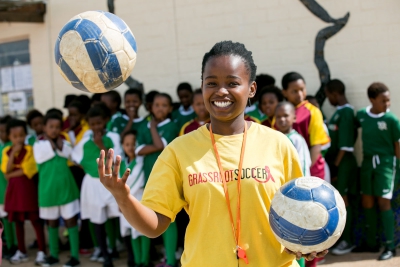In 2016, approximately two in five new HIV infections among adults in the eastern and southern African region were among young people between the ages of 15 and 24. Seventy per cent of these infections are among adolescent girls and young women. This translates to approximately 4 000 new HIV infections per week among adolescent girls and young women in the region; more than double the rate among adolescent boys and young men (1 800). Other sexual and reproductive health issues continue to affect adolescent girls and young women, including high rates of unintended pregnancies; gender-based violence and gender inequality. Owing to a growing youth bulge across the region, young people are also disproportionately affected by poverty, unemployment and inequity.
The Lancet Commission on Adolescent Health and Well-being estimates that investment in adolescent health will generate an economic benefit ten times that of the investment, by 2030. Agenda 2030 and other related strategies argue that effective use of available resources in a time of economic uncertainty is critical; as well as partnerships that build concrete commitments and promote collective action together with young people.
In order to gather insights on how partners can improve collaboration and deliver better health outcomes for young people, Grassroot Soccer recently hosted a 2018 Adolescent Health Partnership Forum in Soweto, South Africa. Participants at the forum, which included government, civil society, development partners, private sector, health experts and young people themselves, agreed that it is critical to leverage comparative resources and expertise to deliver evidence-informed interventions for adolescents, at scale.
The Grassroot Soccer sports-based approach aims to build the assets of young people, promote access to youth- friendly services and ensure adherence to life saving medicines and healthy habits.
Quotes
“Adolescents want what everyone else wants. We seem to forget that we have been adolescents. We forget they have same right to health as everyone else. They want confidentiality; they want treatment with dignity. They want security, safety, trust, confidentiality, respect and more—in both health centres and schools.”
CATHERINE SOZI, DIRECTOR, UNAIDS REGIONAL SUPPORT TEAM FOR EASTERN AND SOUTHERN AFRICA
“Adolescents and young adults today don’t want to be managed, they want to be coached.”
CARL MANSER, HEAD OF NEW VENTURES AND PARTNERSHIPS, LIFE HEALTH CARE
“Being a good female soccer player just isn’t enough. Girls’ access to health services is a priority and having support structures that lift up girls and young women is very important.”
AMANDA DLAMINI, FORMER SOUTH AFRICAN NATIONAL WOMEN’S SOCCER TEAM (BANYANA BANYANA) PLAYER AND DEVELOPMENT ACTIVIST
